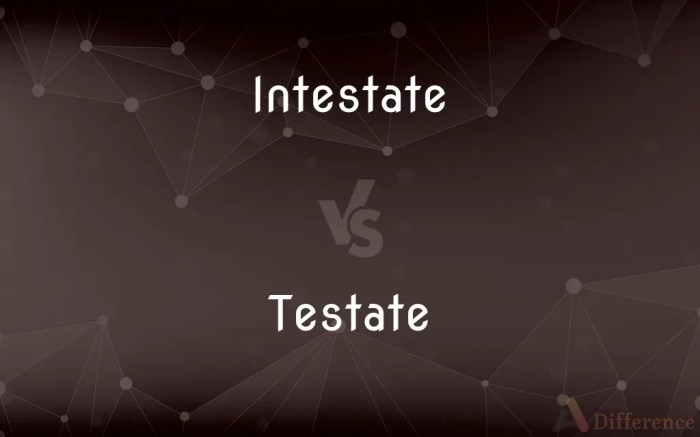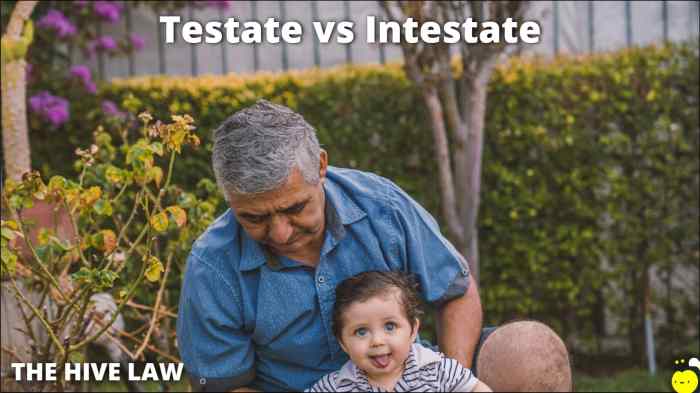Difference between testate and intestate – The distinction between testate and intestate individuals is a fundamental legal concept that determines the distribution of assets upon death. Understanding the implications of being testate or intestate is crucial for individuals seeking to manage their estates effectively.
This comprehensive guide delves into the nuances of testate and intestate estates, exploring the legal framework, probate process, and the significance of having a valid will in place. By examining the responsibilities of executors and the challenges encountered in estate administration, this analysis provides a holistic understanding of the complexities involved in estate planning.
1. Testate vs. Intestate
An individual is considered testate if they have created a valid will, which is a legal document that specifies how their assets should be distributed after their death. Conversely, an individual is considered intestate if they die without a valid will.
Examples of Testate and Intestate Individuals, Difference between testate and intestate
- Testate:A person who has signed a legally valid will that meets all the requirements for a valid will.
- Intestate:A person who dies without a valid will or whose will is deemed invalid by the court.
Legal Implications of Being Testate or Intestate
- Testate:The individual’s assets will be distributed according to the terms of their will.
- Intestate:The individual’s assets will be distributed according to the laws of intestacy, which vary by jurisdiction.
2. Wills and Probate: Difference Between Testate And Intestate

A will is a legal document that Artikels an individual’s wishes regarding the distribution of their assets after their death. The probate process is the legal procedure by which a will is validated and the estate is administered.
Role of a Will in Asset Distribution
- A will allows an individual to control the distribution of their assets after their death.
- Without a will, the distribution of assets will be determined by the laws of intestacy.
Probate Process for Testate and Intestate Individuals
- Testate:The will is submitted to the court for probate, which involves proving the will’s validity and appointing an executor.
- Intestate:The court appoints an administrator to administer the estate according to the laws of intestacy.
Importance of a Valid Will
- Ensures that assets are distributed according to the individual’s wishes.
- Prevents disputes and legal challenges.
- Facilitates a smooth and orderly administration of the estate.
3. Estate Administration

Estate administration is the process of managing and distributing an individual’s assets after their death.
Steps in Estate Administration
- Probate the will (if applicable).
- Identify and inventory the assets.
- Pay debts and expenses.
- Distribute the remaining assets to beneficiaries.
Responsibilities of an Executor
- Testate:Carries out the instructions in the will.
- Intestate:Administers the estate according to the laws of intestacy.
Challenges in Estate Administration
- Contesting a will or probate.
- Dealing with complex financial assets.
- Resolving disputes among beneficiaries.
4. Intestacy Laws

Intestacy laws determine the distribution of assets when an individual dies without a valid will.
Overview of Intestacy Laws
- Vary by jurisdiction.
- Typically prioritize spouses, children, and other close relatives.
How Intestacy Laws Determine Asset Distribution
- The assets are distributed according to a predetermined order of priority.
- The order of priority is based on the degree of relationship to the deceased individual.
Factors Influencing Asset Distribution Under Intestacy Laws
- Marital status.
- Number and age of children.
- Existence of other relatives.
5. Contesting a Will or Probate

A will or probate may be contested on various grounds.
Grounds for Contesting a Will or Probate
- Lack of testamentary capacity.
- Undue influence or coercion.
- Fraud or forgery.
Legal Procedures for Contesting a Will or Probate
- Filing a petition with the court.
- Providing evidence to support the grounds for contest.
- Participating in a hearing or trial.
Potential Consequences of Successfully Contesting a Will or Probate
- The will may be declared invalid.
- The probate process may be reopened.
- The distribution of assets may be altered.
FAQ Resource
What is the primary difference between testate and intestate individuals?
Testate individuals have created a valid will outlining their wishes for asset distribution, while intestate individuals have not.
What is the significance of having a valid will?
A valid will ensures that an individual’s assets are distributed according to their wishes, reducing the likelihood of disputes and ensuring their legacy is honored.
What are the potential challenges in estate administration?
Estate administration can involve complex legal processes, tax implications, and potential disputes among beneficiaries, requiring professional guidance and careful planning.